
If good things come to those who wait, Mackenzie Arnold has got it made.
After a decade of waiting in the wings as the Matildas’ back-up goalkeeper to the likes of veteran players Melissa Barbieri and Lydia Williams, the 30-year-old from the Gold Coast is finally getting her moment to shine.
Following her outstanding performance as the number one shot-stopper at last year’s FIFA Women’s World Cup and that now legendary penalty shootout against France, Arnold became a household name and a national hero.
Nicknamed the “minister of defence” and the “brick wall” for her intimidating presence on the pitch, epic saves and intense stare-downs which helped the national team reach its first World Cup semi-final, Arnold’s star has only continued to rise.
In September, she was named captain of English team, West Ham United, and was later announced as one of three finalists for the Best FIFA Women’s Goalkeeper award. She scored a sponsorship deal with Nike, which quickly released her in-demand purple goalkeeper jersey for fans to purchase, and she has had collaborations with Kia, Just Jeans and, most recently, Penguin Random House Australia for a five-book deal.
She’s at the peak of her powers and, come July, Arnold will be as ready as she’s ever been to put on the gloves and take her position between the posts for the first time at an Olympic tournament as starting goalie.
“With the last Olympics I wasn’t really involved with the squad,” Arnold says via video call. She’s dialled in from the United States during a Matildas training camp, hair tied up in her signature top knot and a not-so-small cut on her forehead following a recent knee to the head during a match against Liverpool.
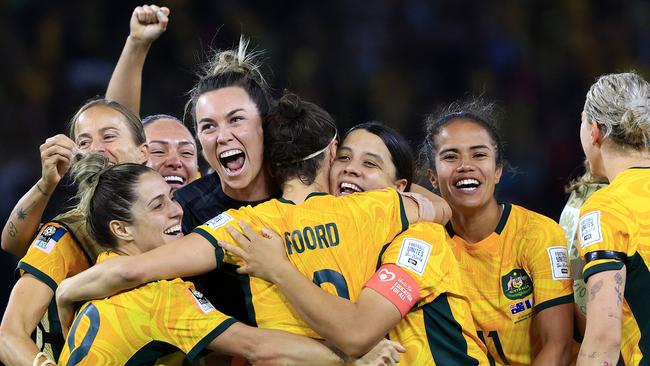
“I was in the stands for all of the games and just sort of feeling that distance from the team,” she says. “Coming into this one, obviously I have the position that I can potentially be playing most games hopefully, but again I don’t know what’s around the corner … I don’t like to plan too far ahead or look too far ahead.”
Assuming nothing and taking one game at a time is all part of Arnold’s new-found approach to playing for the Matildas. She hit a career-low following a medial collateral ligament (MCL) injury in 2021 that took her out of action for months and mentally threw her off her game when she eventually returned.
Sitting on the sidelines at the Tokyo Olympics cut deep, and after years of struggling to translate her strong club performances to the national team, everything changed when she was selected as starting goalie for three consecutive games at the four-nation Cup of Nations tournament in February last year.
“When I was given that opportunity, it was almost like, ‘I’ve got nothing to lose, I can’t go backwards’.
“At the time I think I was third goalkeeper, so there was nothing more I could have done really to get any worse. I just played, I enjoyed it, there was no pressure. I played well and I think that was the first time in a long time I actually really enjoyed playing for the national team and put a performance like that together,” she says.

Conceding just two goals and making nine key saves, Arnold was awarded Player of the Tournament, helping the national team win every match against the Czech Republic, Spain and Jamaica and ultimately the Cup. It was the confidence boost she needed.
When the team later came face-to-face with England in a friendly and won 2-0, Arnold finally started believing in herself like never before. “That was my biggest turning point … That was such a top team and I wouldn’t say I wasn’t nervous but I just really enjoyed it,” she says.
“I was longing for that feeling for so long with the national team. That’s ultimately what I needed to get the confidence and keep playing like I was.”
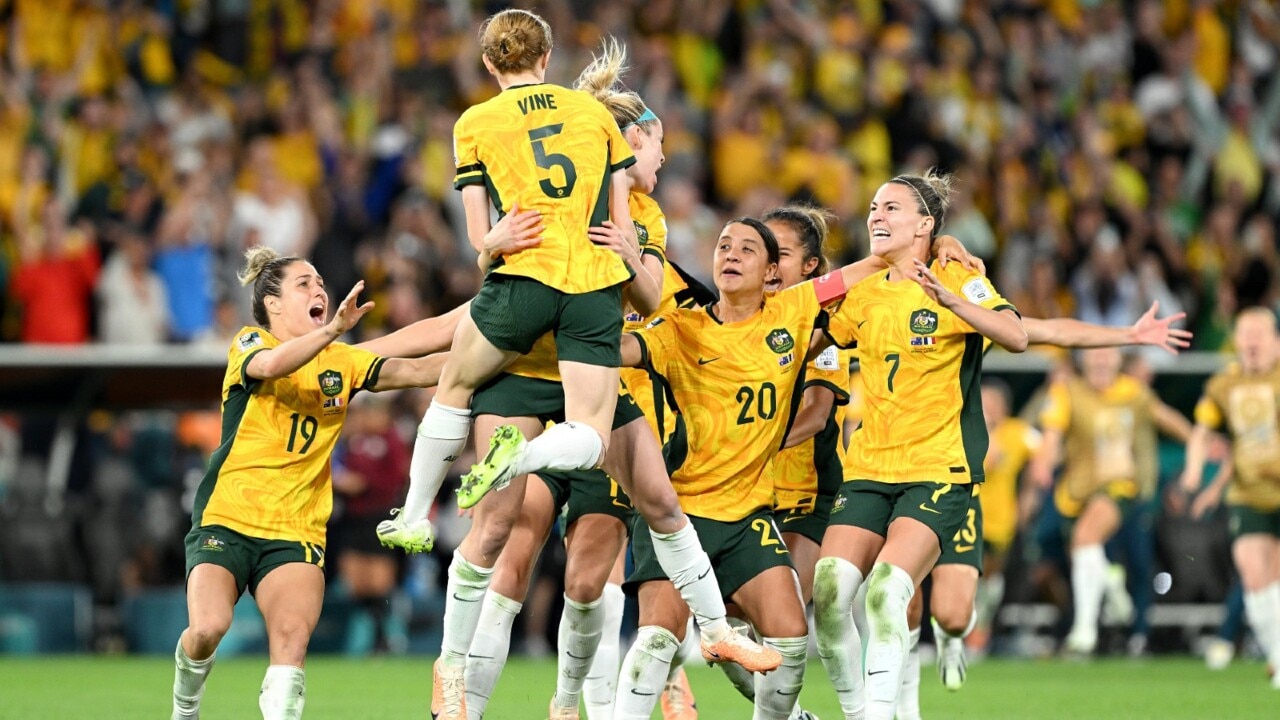
Arnold’s friends and teammates had been encouraging and supporting her for years, but she always found excuses not to believe them.
“When it came to games, it was almost like I was in another mindset. I was almost scared to play. My mindset from when I was playing at West Ham to when I was playing at the national team was two completely different players.
“I think that was my biggest obstacle for a long time. I’d even talk about it with the girls. They would tell me, ‘You’re good enough, you should be starting’ but it was almost like I took it with the mindset of, ‘You have to say that because you’re my friends’, things like that. I never let myself believe I belonged in the starting 11, basically.”
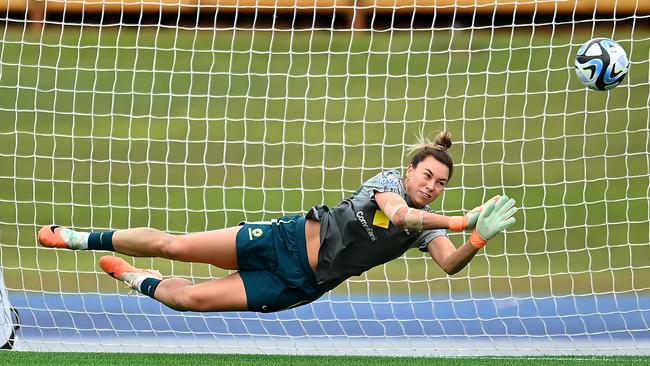
Matildas goalkeeping coach, former Socceroo and Football Australia’s head of goalkeeping Tony Franken has long been a big supporter of Arnold.
He says her consistency over the past year has come from her improved mindset.
“There is a stronger sense of self-belief which has translated to her performance on the field and her leadership on and off the field. Those are all vital for the goalkeeping position,” Franken says, adding that she brings many unique traits to the position.
“She is a player that dominates her penalty area and fills the goal to make it tougher for the attacker. When she is in that penalty area, she is also strong in her ability to make saves from all angles, while her ball handling is strong and consistent. For the type of playing style for the Matildas, Mackenzie is good with her feet which makes her dependable with her distribution.
“That helps the team as the Matildas’ style is to start our attacks from the back and Mackenzie can hit players with short or long passes.”
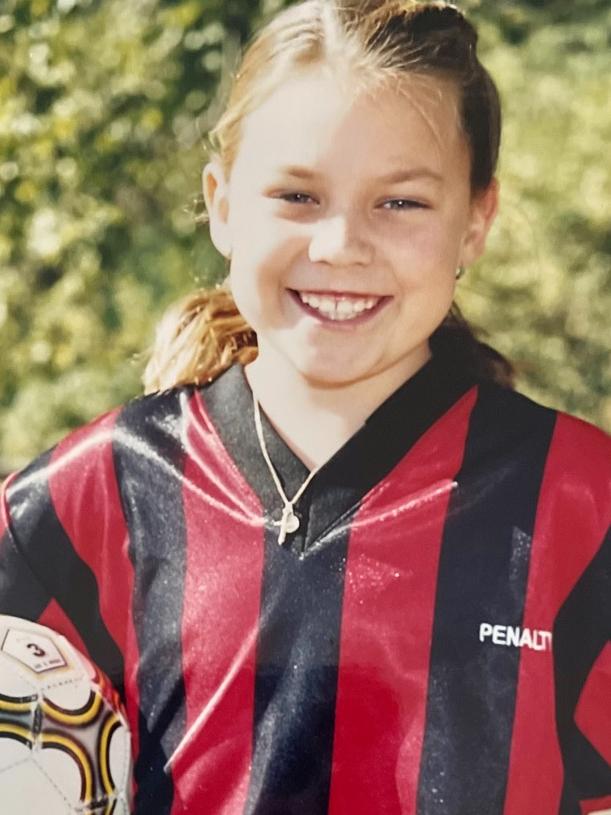

A lifelong rugby league fan, Arnold was never afraid of a ball hurtling towards her. Growing up in Mermaid Beach, she played rugby league “non-stop” with her big brother Sam in the backyard.
“I think from playing rugby league with my brother, I wasn’t really scared of the ball,” she says. “A lot of the girls (at soccer) didn’t want to go near it with their hands but I was just like, ‘whatever’.”
While Arnold’s parents Leah, an accountant, and Steve, a mechanic, were happy enough for her to play rugby league for fun, they weren’t keen on her joining a club.
“There were no girls’ teams so if I wanted to play I had to be on the boys’ team and it was just a bit rough,” she says. “Mum and dad weren’t really happy about it.”
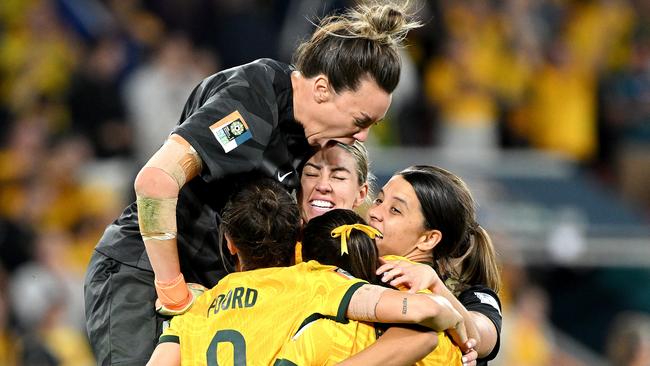
Instead, Arnold started playing soccer when she was seven – along with every other sport under the Gold Coast sun.
“There was tennis, soccer, swimming, golf for a while – just anything that I could be outside with I was just loving,” she says. When she was asked to play goalie for a representative team as a teenager, however, she flat-out refused.
“I was like, ‘Absolutely not,’” she says.
“I just was never going to be a goalkeeper. That was never in the plan. Then I went back to my club team at Burleigh Bulldogs and they needed a goalkeeper and I was like, ‘You know what, why not, I’ll just try it, see how it goes’’ and that was pretty much it. I ended up really enjoying it. I don’t know if it was just because I got to play with my hands and that’s what I ultimately wanted to do with rugby league. I got to actually catch the ball and do all the similar kinds of things you would do with a footy.
“I would say it ultimately chose me. I wasn’t the best on the field, I’m quite a tall girl, my frame isn’t really built for a quick fullback. I think it just fit.”

As part of her deal with Penguin Random House Australia, Arnold will release four children’s books which she hopes will inspire kids to have fun playing the game and not take it too seriously too soon.
“When it started to get serious or move quite quickly, that’s when I withdrew a little bit from the position and I wasn’t playing my best because the fun got sucked out of it,” she says.
“I know you get to a level where it can’t all be fun, and I understand that, but I think at a younger age it’s important to enjoy it, otherwise you’ll give it up.”
Arnold went on to train at the Queensland Academy of Sport and made her debut for the Matildas in 2012 at the age of 18. She’d already joined the W-League the previous year when she was 17 playing for Perth Glory and later played for Canberra United, Western Sydney Wanderers and Brisbane Roar.
She was named W-League Goalkeeper of the Year three times and later played in Norway for Arna-Bjørnar and the USA for the Chicago Red Stars. In 2020 she packed her bags for London to sign with West Ham United where she soon met her partner, Scottish football player and teammate Kirsty Smith.
“We just hit it off; we really got along. We’re in each other’s pockets basically training together and living together, so that’s been fun. She complements me a lot, I complement her, and I think we bring out the best in each other so that’s been nice,” she says.

Along with her best friends and teammates Alanna Kennedy and Caitlin Foord, who she has known since she was 17, Arnold says one of her biggest supporters in life has been her brother. Five years her senior, Sam, who had significant hearing loss from a young age, was instrumental in helping Arnold face her own hearing loss last year when she got her first pair of hearing aids.
“I’m starting to train with them in. I’m still not playing with them yet, but I can see that happening very soon. I’m trying to ease myself into it and not make it a thing. I know I’ll think about it too much if I make a conscious effort to do it, so if I leave them in, I leave them in and if I take them out, I take them out. It doesn’t affect me on the field in any way. It’s just a bit of a transition at the moment,” she says.
Arnold can see herself returning to the Gold Coast one day, perhaps to start her own goalkeeping academy. For now she visits every chance she gets to catch up with family and friends and soak up some Aussie sunshine.
A memoir written by sports journalist Emma Kemp is the fifth book in her deal with Penguin Random House Australia. Arnold says it will give readers an insight into the lesser-known challenges she has faced. “Because I haven’t really been part of the starting 11 for a long period of my career, I feel like there’s a lot of things that happened behind the scenes that I go into a little bit more detail about,” she says. “It’s sharing the struggles a little bit and sharing my mindset and how it’s changed over the years.”
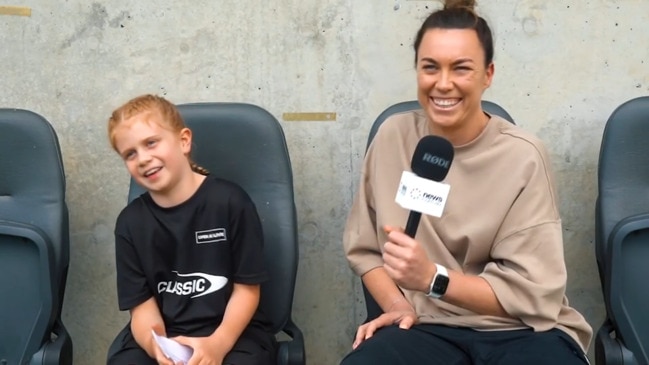
The book is due to come out near the Olympics when Arnold, the Matildas and the rest of Australia hope to be celebrating a medal win. If they succeed, they’ll be the first Australian football team – male or female – to win an Olympic medal. After finishing fourth in Tokyo and fourth again at last year’s World Cup, they are more determined than ever.
Whatever happens, Arnold takes great pride in what they’ve done for women’s sport. Not only are they attracting record crowds and selling out home stadiums, they’ve also helped drive up girls’ participation in soccer with new figures from Football Queensland showing a
44 per cent growth this year, in large part due to the Matildas’ World Cup performance.
“We’ve always wanted to inspire the next generation and I feel like it’s been a long time coming,” Arnold says.
“We went into the World Cup wanting to do exactly that and to come out the other end and realise we’ve probably done that and a little bit more, especially in a country that’s not really a footballing nation, to see everyone jump on the wagon, boys and girls … you would never have dreamt about that even three years ago. I can’t put into words how much it means to us. It’s taken a while to sink in and realise what we have done. It honestly means everything.”

Add your comment to this story
To join the conversation, please log in. Don't have an account? Register
Join the conversation, you are commenting as Logout
Machete gang’s violent spree leaves trail of destruction, anger and fear
A group of hooded offenders armed with knives, a machete and tools have left a trail of destruction and fear in their wake, following a violent crime spree across Brisbane’s south and beyond. WATCH THE VIDEO
Dozens stranded as tide runs out on island barge
A misjudgment left a Moreton Bay island barge stuck in mud, sparking outrage among residents and reigniting debates over the islands’ transport strategy.